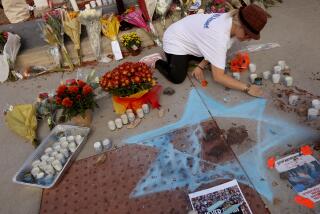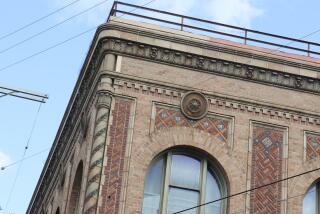How to zone a synagogue?
How much leeway do city officials have in enforcing zoning laws? Do they have authority to zone out houses of worship? Is it constitutional to privilege the property rights of the religious over those of nonbelievers? And how in the name of Yahweh did leafy, Sabbath-quiet Hancock Park become the center of a bitter struggle over Jewish identity? These are just a few of the questions raised by a recent court decision in the long-simmering battle over an Orthodox synagogue at the corner of Highland Avenue and 3rd Street.
For those who got to shul late, a recap: Beginning in 1996, Congregation Etz Chaim sought a conditional-use permit to build a synagogue on its property at the busy intersection. The congregation, facing tough opposition from neighbors, had no success until Congress -- spurred in part by this specific case -- passed the Religious Land Use and Institutionalized Persons Act of 2000, outlawing land-use regulations that impose “substantial burden on the religious exercise of a person, including a religious assembly.”
The city then reached an agreement allowing Etz Chaim to use the property for a synagogue, under the conditions that it not exceed a certain number of worshipers and not use the property for other activities.
A group called the League of Residential Neighborhood Advocates sued the city, claiming the settlement was illegal. Last week, the U.S. 9th Circuit Court of Appeals ruled for the neighborhood group, stating that the city had no authority to waive regulations without proof that failing to do so would violate federal law.
The court’s reasoning seems strange; given the Etz Chaim saga’s featured role in the original passage of the religious land use act, it’s hard to argue that the city was not correct in seeking to comply with the federal law. Ironically, the city and the neighborhood activists may end up being the big losers if this settlement is thrown out, because Etz Chaim will still be able to fight for its rights under the act. In that case, the congregation could end up winning full rights to use the property, unencumbered by the terms of its settlement. Meanwhile, city authorities would be further constrained in their zoning discretion.
Then again, the congregation would be taking a gamble if it appealed this case to the Supreme Court, as Etz Chaim’s lawyer has suggested doing. The religious land use act replaced an earlier act of Congress that was ruled unconstitutional in the mid-1990s, and there is reason to believe that the newer law’s unique property protections for religious groups may violate the 1st Amendment’s establishment clause.
Hancock Park, once a restricted area and now home to thriving populations of both secular and religious Jews, is an odd place for such tension over religious freedom and community demands. Given how much both sides stand to lose in court, the wise path would be to tone down the passions and let everyone go, and worship, in peace.
More to Read
A cure for the common opinion
Get thought-provoking perspectives with our weekly newsletter.
You may occasionally receive promotional content from the Los Angeles Times.






